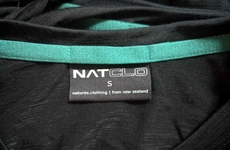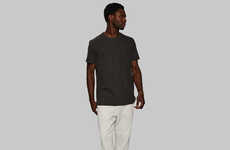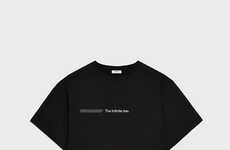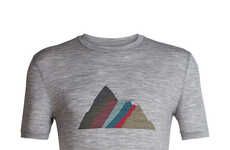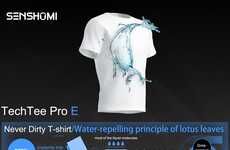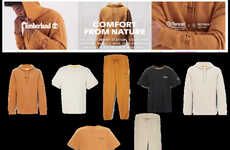
Allbirds' TrinoXO Tees are Made with Discarded Crab Shells
Laura McQuarrie — October 20, 2020 — Eco
References: allbirds & fastcompany
Allbirds' new TrinoXO Tee for men and women boasts a soft and fresh feel, plus odor-reducing properties that come from a mix of materials. The t-shirts are made with a blend of TENCEL Lyocell, merino wool and Chitosan—a type of fiber that comes from exoskeletons.
The TrinoXO Tee made with discarded crab shells fits in with Allbirds' mission to create eco-friendly goods with a low carbon footprint, all the while making the most of the unique material’s inherent antimicrobial properties. While there are many chemically treated antimicrobial designs that are now being introduced, this one is a natural alternative. First, the material is made by grinding shells into powder, then coating the fabric with a natural material, extruding it and weaving it into fabric.
Image Credit: Allbirds
The TrinoXO Tee made with discarded crab shells fits in with Allbirds' mission to create eco-friendly goods with a low carbon footprint, all the while making the most of the unique material’s inherent antimicrobial properties. While there are many chemically treated antimicrobial designs that are now being introduced, this one is a natural alternative. First, the material is made by grinding shells into powder, then coating the fabric with a natural material, extruding it and weaving it into fabric.
Image Credit: Allbirds
Trend Themes
1. Eco-friendly Fashion - Companies can explore the use of sustainable and natural materials to produce clothing that has a low impact on the environment.
2. Antimicrobial Fabric - Incorporating naturally antimicrobial materials like chitosan can provide a chemical-free alternative to traditional antimicrobial textiles.
3. Circular Economy - Using discarded materials like crab shells for clothing production can promote a circular economy by reducing waste and creating new value from existing resources.
Industry Implications
1. Fashion - Fashion brands can explore the use of sustainable materials to create eco-friendly clothing lines while also increasing brand differentiation through unique materials.
2. Textiles - Textile manufacturers can innovate by incorporating natural and sustainable materials into their production processes to meet the demand for eco-conscious textiles.
3. Sustainability - The adoption of sustainable and circular economy practices in various industries, including fashion and textiles, can promote a more environmentally friendly future.
5.5
Score
Popularity
Activity
Freshness



